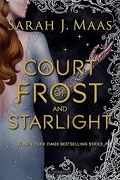I would never give a book written by Sarah J. Maas anything less than three stars, because her books are always very well written. Having said that, do I think that A Court of Frost and Starlight adds to the overall story in a way that it bridges trilogy one (Feyre and Rhys) with trilogy two (Nesta)? Both yes and no.
I previously mentioned that I am usually apprehensive when encountering a novella. I often feel that it’s little more than fanfiction written by the author themselves. I also mentioned while reviewing The Assassin’s Blade (also by Sarah J. Maas, a bind-up of prequel novella’s for her Throne of Glass series), that I thought the bind-up absolutely vital to her overall series. It chronicles meets that become really relevant in the other books at one point or another and while you can do without them, it adds background and depth to the relationships.
Because of that, I was very hopeful going into A Court of Frost and Starlight. I do have to admit that I believe this novella to be less relevant. Of course we see Nesta spiral down further and further until even she can’t believe how low her rock bottom is. But could it have been written in book one of her own series? Absolutely. I liked the new information on Nesta and to see where the three sisters now stood, but I didn’t really need a new novella for that.
On the other hand, Feyre’s storyline about the painting straight up annoyed me in the sense that she reverted back to behaviour she had previously overcome. Of course, she hadn’t actually painted yet, only started seeing paintings in her mind again, and that was a step Feyre could naturally take in this book. Her need to sneak around with it didn’t resonate much with me, but the scene with the weaver and the dark cloth brought tears to my eyes. That scene was so beautiful, and I read that Sarah J. Maas found it a really powerful moment as well.
I’m finding it difficult to write a long review about it. I liked reading it a lot, because I always like reading about the characters in the ACOTAR-series. The storyline of Feyre and Rhys was unusually bland, but that’s what you get when you try to write from a character’s perspective after wrapping up their storylines. There is more to Feyre and Rhys than just happily-ever-after of course, but a novella is not the medium to start upsetting their status quo again. So Sarah J. Maas does not. And because this is not Nesta’s story yet, there isnt’really anything upsetting the status quo there either.
Seeing Nesta struggle through the Winter Solstice celebration was a very interesting scene, I have to admit. You can see her trying and failing, trying and failing. At least the woman is still trying, which tells both the reader and Feyre that something can still be done for her. The way Feyre faces her sister in the final chapter (actually the sneak peak chapter) was really fun. She has always deferred to Nesta as being the oldest, and because she has always been a little frightened of her. But Feyre is comfortable in her own skin now. She controls her own power, and is healed and strengthened through her relationship with Rhys. She is High Lady of the Night Court. Finally, Feyre knows how to shift the balance in her own favour, and that promises much delicious conflict for the new trilogy.
In conclusion
In the end, A Court of Frost and Starlight does not upset the status quo. I still find the entire Azriel-Elain-Lucien thing very interesting, and I very much like the idea of Nesta having to go to the Illyrian camps with Cassiel. It’s good to know that Jurian and Vassa teamed up and I’m really hoping we get to see more of those amazing characters. Feyre and Rhys… well, the last book was essentially the end of their story, and they deserve their happiness. A novella shouldn’t upset that, and it doesn’t – but that does make their storyline feel flat and without much use. I don’t think the novella needed to be written, but I loved reading it nonetheless. No fan would ever say no to it, nor should you. But was it significant as a bridge between two trilogies, with vital information? No.



